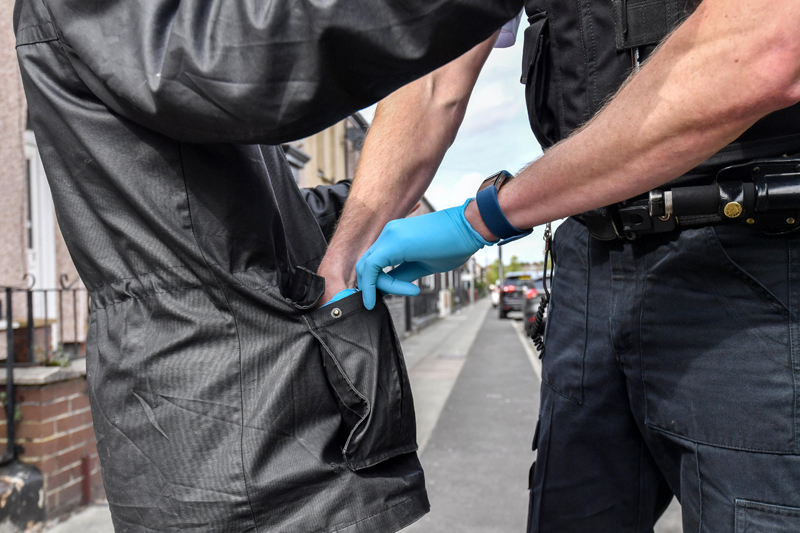The UK Government has extended police stop-and-search powers as part of its recently announced Beating Crime Plan. This is despite concern that black and minority groups are more likely to be unfairly targeted by police when they have greater discretion over who they stop and search.
The Government’s own assessment of these changes stated it was expected that any increases in Section 60 stop and searches was likely to disproportionately affect black and minority ethnic people.
In the plan, the Government states that these measures are needed to prevent knife crime. But there is little evidence to suggest more stop and search solves this problem.
Stop-and-search rules were relaxed in March 2019 on what was originally meant to be a temporary basis. The change made it easier for police officers to use Section 60 of the Criminal Justice and Public Order Act 1994 that allows them to stop and search anyone in a specified geographic area without the usual legal requirement for “reasonable suspicion”.
Under the change, officers could seek authorisation for a Section 60 from inspectors rather than having to seek approval from a higher rank. This meant more officers were available to approve a Section 60, making them more easily authorised. They were also able to apply for a Section 60 to be in place for a longer period of time than before (up to 48 hours).
The Government’s own assessment of these changes stated it was expected that any increases in Section 60 stop and searches was likely to disproportionately affect black and minority ethnic people. Yet the Beating Crime Plan permanently gives police forces the option to relax the rules around Section 60 stop and search.
Where’s the evidence?
The temporary relaxation of Section 60 rules was initially introduced as a 12-month pilot scheme in March 2019 to be tested in seven forces to tackle knife crime. However, by August 2019, the Government had rolled out the scheme nationally, giving all police forces the option to adopt these relaxed requirements.
Research conducted by the Home Office has previously found that increasing stop and search had little to no crime-reduction effect.
An evaluation of the pilot was commissioned by the Home Office, alongside promises to “assess the results”. The results of this evaluation have not yet been published.
The Beating Crime Plan states that “We know from the data that our approach is working”, a claim that is not backed by published evidence.
As outlined in a recent super-complaint submitted to the Government by the Criminal Justice Alliance (CJA), there is little evidence to support the claim that Section 60 stop and searches reduce knife crime.
Research conducted by the CJA found that Section 60 is highly ineffective, with only around 1% of searches leading to an arrest for weapons. They also argue that it is likely to cause more harm than good in the community.
There is also a lack of evidence to support the argument that increasing stop and search is effective at addressing serious violence, such as knife crime. Research conducted by the Home Office has previously found that increasing stop and search had little to no crime-reduction effect.
The Home Secretary and Prime Minister insist stop and search is an effective approach to stopping crime but the evidence says otherwise.
Disproportionate impact
Since the relaxation of the rules in 2019, Section 60 searches have risen across the country. From 2018-19 to 2019-20, Section 60 searches across all forces have increased by 35%.
Section 60 stop and searches accounted for around 3% of total stop and searches conducted during 2019-20. The other powers that the police possess to stop and search members of the public (for example, the Police and Criminal Evidence Act 1984 or PACE), require officers to have a reasonable suspicion that an individual is carrying an illegal item.
Under Section 60, officers do not need to have a suspicion to stop and search individuals. This gives officers more discretion in who to stop and removes the legal threshold granted to citizens to protect them from being arbitrarily stopped and searched.
The available evidence suggests handing sweeping powers to the police to stop people and search them without strong justification is not an effective way to prevent crime.
It is clear that Section 60 stop and searches, along with other stop-and-search powers, disproportionately affect black and ethnic minority communities. For example, Home Office figures show that in London during 2019-20, black people were up to eight times more likely to be stopped and searched under Section 60 than their white counterparts.
Under other powers, such as PACE, black people were four times more likely to be stopped and searched compared to white people. This suggests that the removal of reasonable grounds under Section 60 is likely to increase disproportionately.
The unjust use of stop and search causes innocent people to feel targeted and victimised by the police based on their ethnicity. In the long term, it eradicates trust and confidence in the police and alienates entire communities.
Knife crime and violence are complex problems that require an evidence-informed approach. The available evidence suggests handing sweeping powers to the police to stop people and search them without strong justification is not an effective way to prevent crime. Meanwhile, it causes harm to people and damages their relationship with the police, particularly those from black and minority ethnic communities.
This article is republished from The Conversation under a Creative Commons licence. You can read the original article here.
About the authors
 Winifred Agnew-Pauley is a London-based criminology researcher, focused on policing, drug policy and social bias in the criminal justice system. She currently work as a Research Fellow for the Policing Institute for the Eastern Region (PIER), based at Anglia Ruskin University. Previously Winnie worked on a range of research projects at a number of institutions in the UK and Australia, including the Jill Dando Institute of Security and Crime Science (UCL), International Drug Policy Unit (LSE) and the NSW Bureau of Crime Statistics and Research (Sydney); she is currently undertaking her PhD at Flinders University in Adelaide.
Winifred Agnew-Pauley is a London-based criminology researcher, focused on policing, drug policy and social bias in the criminal justice system. She currently work as a Research Fellow for the Policing Institute for the Eastern Region (PIER), based at Anglia Ruskin University. Previously Winnie worked on a range of research projects at a number of institutions in the UK and Australia, including the Jill Dando Institute of Security and Crime Science (UCL), International Drug Policy Unit (LSE) and the NSW Bureau of Crime Statistics and Research (Sydney); she is currently undertaking her PhD at Flinders University in Adelaide.
 Bisola Akintoye is a PhD candidate in Social Policy at the University of Kent. Her postgraduate research takes an ethnographic approach to the intergenerational experience of racialised policing in black communities. Bisola is also a qualified solicitor and has a Masters in Law from University College London. She also has experience of teaching the undergraduate module, Introduction to Criminology, at the University of Kent.
Bisola Akintoye is a PhD candidate in Social Policy at the University of Kent. Her postgraduate research takes an ethnographic approach to the intergenerational experience of racialised policing in black communities. Bisola is also a qualified solicitor and has a Masters in Law from University College London. She also has experience of teaching the undergraduate module, Introduction to Criminology, at the University of Kent.



This is a very well written and well researched article. the opinion and views you have stated are identical to mine. Its a challenge to understand why the Home Office doesn’t listen. The safety rail communities can have is some chief constables and DCC’s should take the view that ALL stop and searches must be lawful and legitimate within themselves.
Thank you Montell for your kind comment. Very pleased to hear you agree. I think it is reasonable at the very least to ask for greater transparency surrounding these decisions, and to show that they are supported by evidence. As it is reasonable to expect that all stop and searches be subjected to the same legal threshold of reasonable suspicion.